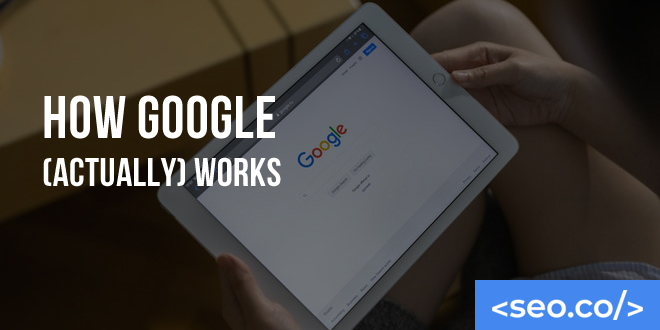
How Google (Actually) Works
Google is undoubtedly the world’s greatest search engine (at least until ChatGPT came around). In fact, Google controls about 92.05% market share in the internet industry. In plain terms, Google holds a monopoly as not only the most used search engine, but also the most popular online resource. It’s no secret that the word “Google” is synonymous with researching something. Consumers will even use Google to find local businesses. Improving your website’s ranking on a search engine is called search engine optimization (SEO). To better understand how SEO and website development works, it’s important to first understand how Google actually works. While Google’s algorithm is extremely complicated (and getting more so every day), understanding the Google basics and the basics of SEO doesn’t have to be extraordinarily complicated. Below is a complete guide in how Google ranks websites. What is Google? Google is a search engine, a platform used by browsers to process websites into search results. When you type in a search term, or a keyword, into the search bar, you’ll receive billions and even trillions of results depending on your query. A query is simply what you’ve searched for. Google’s corporate history starts with its founding by Stanford Ph.D. students Larry Page and Sergey Brin in 1998. As the company grew, investors brought in Eric Schmidt and Jonathan Rosenberg. Schmidt, a seasoned executive, was brought in to act as CEO until Larry and Sergey were seen fit to fully run all operations. Larry subsequently became CEO after Eric Schmidt. Google CEO Larry Page stepped down in 2015 to become Google’s executive chairman. In the early days of the internet, it was difficult to perform extensive research and searches into everyday topics. Google became one of the first search engines available, and it’s still widely used today. Google is owned by Alphabet Inc and receives much of its profit from its landmark advertising service, Google Ads. In fact, Google is the richest company in the world in regards to market capitalization. This is a measure of a company’s value on the market with the total amount of dollars in stocks. Google’s market cap is valued at $117 billion, which is unusual for a search engine. Compared to other search engines like Yahoo and Bing, Google is a global technology leader that acts as the de facto source of information on the internet. As a result of its ability to create superior products, the company has been able to attract smart, creative people who continue to help hone the company’s core search ranking algorithm. To learn more about how Google works, it’s important to first know what a search engine is. Below, we’ll discuss what a search engine is and how it works. What is a Search Engine? The internet is an infinite network that combines all computers from across the world. This way, data, like websites, can be accessible to everyone. If you build a website and host it over a server, other people access it on the internet. The question is — how will others be able to find your website? The answer is through a search engine. A search engine is a software system that helps people carry out web searches. To put it simply, it organizes all information on the internet and compiles them into results based on how relevant they are to a query. To achieve this feat, search engines are built using algorithms, constructed by machine learning and artificial intelligence (AI). For example, the internet serves as a library of information. A search engine serves as a card catalog, or the system that shows people how to locate books in the library. The Dewey Decimal system, a system for ranking items in the card catalog, is the search engine’s algorithm. With all of this said, how has Google built a reputation as the world’s top search engine? The answer is actually simpler than you may think. What is Google’s Business? Like other search engines, Google managers pride themselves on having the most accurate search results in the world. When you search for a pair of “Nike basketball shoes” on Google, you’ll usually be paired with results showing where you can buy the shoes: How does Google know to pair these types of results with queries that have buyer intent? The answer lies in what is known as search intent. This is the intent that a person has when searching for a keyword. When analyzing search intent, search engines assess: Does the web user want to buy a product or research something? Does the web user want to perform research before buying? Does the web user just want to buy something? Google has a very complex algorithm that answers all of these questions. Currently, it’s a mystery exactly how Google’s central algorithm works. Internet marketers rely on snippets of Google’s algorithms through updates to learn more about how the search engine has improved and how they should adapt. To the average person, knowing how Google or a search engine works isn’t necessary. However, billions of people use Google everyday to find local businesses, research products before buying, and even interact with corporate enterprises. Business owners should have an internet in elevating their website’s presence on Google. This process is known as search engine optimization (SEO). What is SEO? SEO is the process of improving your website’s ranking on search engine results pages (SERPs). The higher your website appears in search rankings, the more visible it will be to your target audience. There is a strong correlation between social signals and rankings. There are literally dozens of Google ranking factors that make up SEO. That’s why SEO is a very in-depth process that involves optimizing a website’s appearance to Google’s standards. For example, websites need to be fast to retain users so they can eventually convert. Positioning is important when it comes to SEO. Over 25% of people click on the first Google search result. Many of these people may even click on the second







